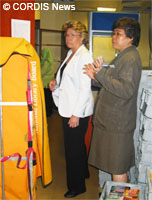Reding highlights importance of collaboration with SE Asia for scientific progress
'We believe in networking,' said EU Information Society and Media Commissioner Viviane Reding, when asked by CORDIS News what Europe has to gain from cooperating with South East Asia. 'Both parts of the world have a lot of good researchers. Scientific discoveries are extremely quick, so sharing results is of utmost importance for progress in both regions,' said the Commissioner. Ms Reding has been on a five-day visit to Singapore, participating in a forum on European-South East Asia cooperation in information and communications technologies (ICT), meeting with her counterparts from the region, and opening the European ICT Pavilion at CommunicAsia2006, part of Asia's largest ICT and media business platform. Asked whether she had found much interest in cooperating with Europe during her visit, the Commissioner was very positive. 'People from Singapore and other parts of ASEAN [Association of South East Asian Nations] understand very well that sharing capacities is the best way to advance,' said Ms Reding. A number of people had expressed interest in travelling to Europe for the Commission's information society technologies (IST) conference, taking place in Helsinki in November, she added. 'They want to know their European counterparts personally,' she said. Of the 800 participants in the ICT forum, around 350 were Europeans. While there was a mix of European nationalities represented, the majority had come from the EU's largest Member States. When this was put to the Commissioner, she seemed quite surprised but unconcerned. In general Europe's smaller countries are very good at participating in the EU's research programmes. The Commissioner was given a presentation of Singapore's national library on 20 June, and then a tour of some of its innovative facilities. Ms Reding was particularly interested in the concept of e-books - a service offered by the library. Users are able to download available e-books in a pdf format, or onto their personal digital assistants (PDAs). The e-books are encrypted so that if they are not 'returned' before the due date, they will automatically expire and be unreadable. Users are also unable to print the e-books. The library staff also showed how technology has been introduced to make the lending and information retrieval procedures more efficient. Library visitors are able to return their books at an electronic book drop that immediately removes the lending title from the person's profile so that he or she can immediately take out more books. Once a book has been returned, it goes through an intelligent conveyer belt process that sees it back on the shelf within four hours. The library is also looking at introducing smart shelving, in order to reduce still further the likelihood of books being mislaid. The library also hosts virtual exhibitions after physical exhibitions have finished, and replies to research requests sent by SMS. Singapore's libraries have 2.7 million visitors each month, who take out 2.3 million books or other publications every month. With a population of only 4 million, the country's interactive libraries are obviously appreciated by Singaporeans. 'We are bringing knowledge to Singapore for economic and social benefit,' the head of Singapore's National Library Board told Ms Reding.
Countries
Singapore



